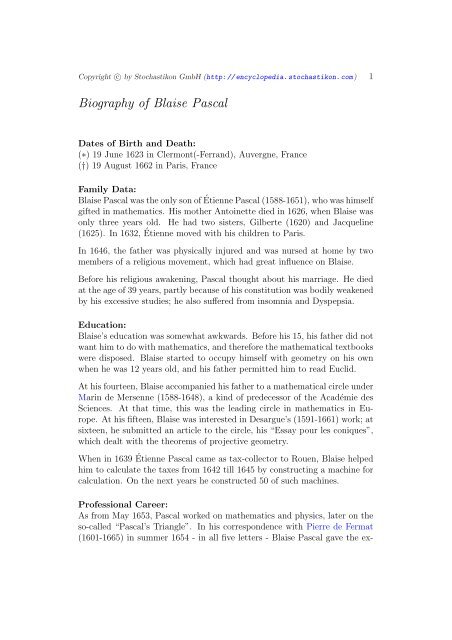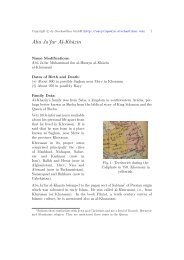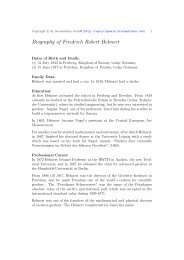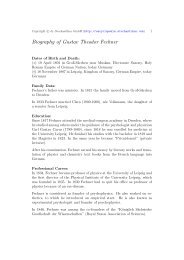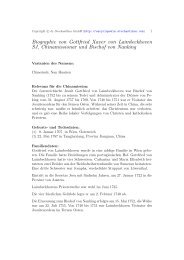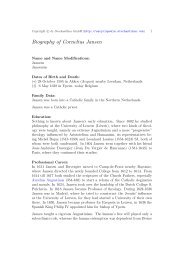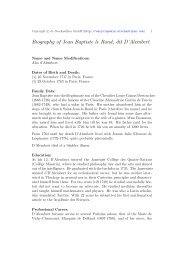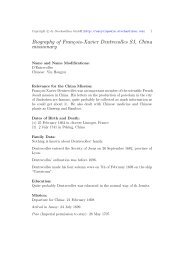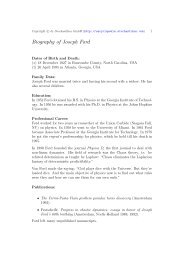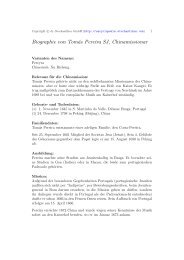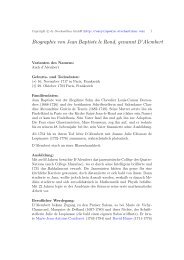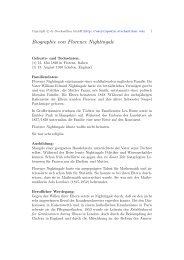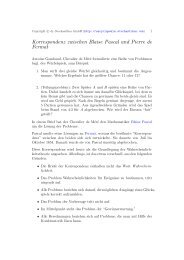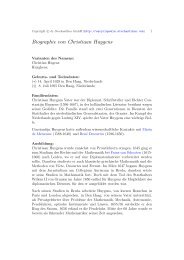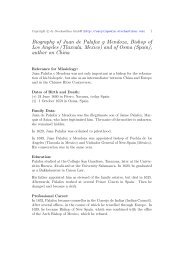Biography of Blaise Pascal
Biography of Blaise Pascal
Biography of Blaise Pascal
You also want an ePaper? Increase the reach of your titles
YUMPU automatically turns print PDFs into web optimized ePapers that Google loves.
Copyright c○ by Stochastikon GmbH (http://encyclopedia.stochastikon.com) 1<br />
<strong>Biography</strong> <strong>of</strong> <strong>Blaise</strong> <strong>Pascal</strong><br />
Dates <strong>of</strong> Birth and Death:<br />
(∗) 19 June 1623 in Clermont(-Ferrand), Auvergne, France<br />
(†) 19 August 1662 in Paris, France<br />
Family Data:<br />
<strong>Blaise</strong> <strong>Pascal</strong> was the only son <strong>of</strong> Étienne <strong>Pascal</strong> (1588-1651), who was himself<br />
gifted in mathematics. His mother Antoinette died in 1626, when <strong>Blaise</strong> was<br />
only three years old. He had two sisters, Gilberte (1620) and Jacqueline<br />
(1625). In 1632, Étienne moved with his children to Paris.<br />
In 1646, the father was physically injured and was nursed at home by two<br />
members <strong>of</strong> a religious movement, which had great influence on <strong>Blaise</strong>.<br />
Before his religious awakening, <strong>Pascal</strong> thought about his marriage. He died<br />
at the age <strong>of</strong> 39 years, partly because <strong>of</strong> his constitution was bodily weakened<br />
by his excessive studies; he also suffered from insomnia and Dyspepsia.<br />
Education:<br />
<strong>Blaise</strong>’s education was somewhat awkwards. Before his 15, his father did not<br />
want him to do with mathematics, and therefore the mathematical textbooks<br />
were disposed. <strong>Blaise</strong> started to occupy himself with geometry on his own<br />
when he was 12 years old, and his father permitted him to read Euclid.<br />
At his fourteen, <strong>Blaise</strong> accompanied his father to a mathematical circle under<br />
Marin de Mersenne (1588-1648), a kind <strong>of</strong> predecessor <strong>of</strong> the Académie des<br />
Sciences. At that time, this was the leading circle in mathematics in Europe.<br />
At his fifteen, <strong>Blaise</strong> was interested in Desargue’s (1591-1661) work; at<br />
sixteen, he submitted an article to the circle, his “Essay pour les coniques”,<br />
which dealt with the theorems <strong>of</strong> projective geometry.<br />
When in 1639 Étienne <strong>Pascal</strong> came as tax-collector to Rouen, <strong>Blaise</strong> helped<br />
him to calculate the taxes from 1642 till 1645 by constructing a machine for<br />
calculation. On the next years he constructed 50 <strong>of</strong> such machines.<br />
Pr<strong>of</strong>essional Career:<br />
As from May 1653, <strong>Pascal</strong> worked on mathematics and physics, later on the<br />
so-called “<strong>Pascal</strong>’s Triangle”. In his correspondence with Pierre de Fermat<br />
(1601-1665) in summer 1654 - in all five letters - <strong>Blaise</strong> <strong>Pascal</strong> gave the ex-
Copyright c○ by Stochastikon GmbH (http://encyclopedia.stochastikon.com) 2<br />
planatory statement about the theory <strong>of</strong> probability. He wrote about the<br />
practical problem <strong>of</strong> a gambler, how to finish a game <strong>of</strong> chance without victory<br />
or defeat so that both gamblers can divide the bet justly. With the<br />
throw <strong>of</strong> the dice and their spots Luca Pacioli OFM (1445-1514), Niccolò<br />
Fontana Tartaglia (1499-1557) and Girolamo Cardano (1501-1576) had already<br />
dealt with. <strong>Pascal</strong> could solve the problem with two gamblers, but not<br />
for more.<br />
After an accident which nearly costed his life and after a religious experience<br />
<strong>Pascal</strong> submitted his life totally to Christianity and had contact with the<br />
Jansenists and with the Jansenist cloister Port-Royal. By means <strong>of</strong> probability,<br />
<strong>Pascal</strong> wanted to prove the faith in God: “Let us weigh the gain and<br />
the loss in wagering that God is. Let us estimate these two chances. If you<br />
gain, you gain all; if you lose, you lose nothing.” (Pensées # 233: “Pesons<br />
le gain et la perte, en prenant croix que Dieu est. Estions ces deux cas: si<br />
vous gagnez, vous gagnez tout; si vous perdez, vous ne perdez rien.”)<br />
After his religious experience, <strong>Pascal</strong> nearly stopped to work scientifically.<br />
His fame was founded by his polemical letters, the so-called Lettres Provincales,<br />
directed against the Jesuits’ probabilism in confession.<br />
<strong>Pascal</strong>’s importance is in his correspondence with Fermat, where he laid the<br />
foundation <strong>of</strong> the theory <strong>of</strong> games <strong>of</strong> chance, and from the third section <strong>of</strong> his<br />
Traité. He introduced the concept <strong>of</strong> mathematical expectation, and used it<br />
to find the solution to the problems <strong>of</strong> the numbers observable by the naked<br />
eye. This in turn serves as a catalyst, which enables the probability theory<br />
to develop a pure combinatorial/deductive numeration.<br />
Publications:<br />
• Œuvres complètes, 3 vols. (Paris 1779, Paris 1872-74, Paris 1963, and<br />
many other editions and reprints, for example 2002), <strong>Pascal</strong>’s treatises<br />
on probability in vol. 2.<br />
• <strong>Pascal</strong> im Kontext: Werke auf CD-Rom - französisch-deutsch (Berlin<br />
2003, 2006).<br />
• <strong>Pascal</strong>, oeuvres littéraires complètes (CD-Rom Paris 1998).<br />
• La correspondance de <strong>Blaise</strong> <strong>Pascal</strong> et de Pierre de Fermat: la géometrie<br />
du hasard ou le début du calcul des probabilités (Fontenay aux roses
Copyright c○ by Stochastikon GmbH (http://encyclopedia.stochastikon.com) 3<br />
1983), also in: Oeuvres complètes, vol. 3 (Paris 1779, 1931, etc.), English:<br />
D.E. Smith, A source book in mathematics (New York 1929,<br />
1959), and David (1962) pp. 229-253.<br />
• Traité du triangle arithmétique, avec quelques autres petits traitez sur la<br />
mesme matière (Paris 1665), originating from the correspondence with<br />
Fermat, also in: Oeuvres complètes, English: Smith (1929). The Traité<br />
with only 36 pages consists <strong>of</strong> two parts. The first one is <strong>of</strong> mathematical<br />
nature, the second part deals with “Uses <strong>of</strong> the Arithmetical<br />
Triangle” in four sections: 1. Use in the theory <strong>of</strong> figurate numbers; 2.<br />
Use in the theory <strong>of</strong> combinations; 3. Use in dividing the stakes in the<br />
games <strong>of</strong> chance; 4. Use in finding the powers <strong>of</strong> binominal expressions.<br />
• Pensées [de M. <strong>Pascal</strong>] sur la réligion et sur quelques autres sujets: Qui<br />
ont esté trouvées après sa mort parmy ses papier (Paris 1672, 1678,<br />
1683, 1725, 1734; Amsterdam 1684, 1701, 1709, 1758, ... Paris 1872,<br />
1948, Paris 1967; Saint-Étienne 1971), s.a.: Louis Lafuma (ed., intr.,<br />
ann.), Le manuscrit des Pensées de <strong>Pascal</strong> (Paris 1962), German: Über<br />
die Religion und über einige andere Gegenstände (Darmstadt 1954,<br />
1994), Gedanken über Religion und einige andere Themen (Stuttgart<br />
1997, 2004), Denken mit <strong>Blaise</strong> <strong>Pascal</strong> (Zürich 2006), Gedanken (Ulm<br />
1795; Stuttgart 1881, ... 1991; Köln 1997, 2007; Leipzig 2007).<br />
• Les Provinciales ou lettres écrites par Louis de Montalte: a un provincial<br />
de ses amis et aux Jésuites (s.l s.a.; Cologne 1657, ... 1737; Helmstadt<br />
1664; Amsterdam 1741; Berlin 1878; Paris 1987, 1992, 1994,<br />
2004, 2007), Latin: Ludovic Montaltii Litterae provinciales (Coloniae<br />
1700; Lausanne 1775), German: Die Sitten-Lehre Und Politique Der<br />
Jesuiten... (1740), or: Provinzialbriefe über die Sittenlehre und Politik<br />
der Jesuiten: Nebst dem Leben des Hrn. Paskal und der Geschichte<br />
dieser Provinzialbriefe (Lemgo 1773-1775), or: Briefe gegen die Jesuiten<br />
(Jena 1907), and: Briefe in die Provinz (Darmstadt 1954, 1990),<br />
English: [Les provinciales, or] The mystery <strong>of</strong> Jesuitism: discovered in<br />
certain letters, written upon occasion <strong>of</strong> the present differences at Sorbonne<br />
between the Jansenists and the Molinists, displaying the pernicious<br />
maximes <strong>of</strong> the late Casuits (London 1658 (also online); London<br />
1689 [i.e. 1679]; also online).<br />
• Le coeur et ses raisons (München 1959, 1966, 1977, ... 1988), German:<br />
Logik des Herzens (Ebenhausen b. München 1966).<br />
• The gospel <strong>of</strong> the gospels: Abrégé de la vie de Jésus-Christ (Turin 1999).
Copyright c○ by Stochastikon GmbH (http://encyclopedia.stochastikon.com) 4<br />
Scientific Awards:<br />
The Crater <strong>Pascal</strong> on the moon has his name.<br />
A Rue <strong>Pascal</strong> in the 3rd and 5th Arrondissements in Paris have his name.<br />
Bibliography:<br />
• Charles Coulston Gillespie (ed.), Dictionary <strong>of</strong> scientific biography, vol. X<br />
(New York 1974) pp. 330-342.<br />
• Donald Adamson, <strong>Blaise</strong> <strong>Pascal</strong>: mathematician, physicist, and thinker<br />
about God (New York 1995; Houndmills 2001).<br />
• Francesco Paolo Adorno, La ragione ordinata: saggio su <strong>Pascal</strong> (Napoli<br />
2000).<br />
• Francesco Paolo Adornon, La disciplina cell’amore: <strong>Pascal</strong>, Port-Royal e<br />
la politica (Roma 2007).<br />
• Vlad Alexandrescu, Le paradoxe chez <strong>Blaise</strong> <strong>Pascal</strong> (Bern, Berlin 1997).<br />
• Robert Allard, La jeunesse de <strong>Pascal</strong>: de la légende à l’histoire (Paris<br />
1994).<br />
• Jean Anglade, <strong>Pascal</strong>, l’insoumis (Paris 1988).<br />
• Leslie Armour, “Infini rien”: <strong>Pascal</strong>’s wager and the human paradox (Carbondale,<br />
Ill. 1993).<br />
• Jacques Attali, <strong>Blaise</strong> <strong>Pascal</strong> ou le génie français (Paris 2001), German:<br />
<strong>Blaise</strong> <strong>Pascal</strong>: Biographie eines Genies (Stuttgart 2006).<br />
• Paul J. Bagley, Piety, peace, and the freedom to philosophize (Dordrecht<br />
1999).<br />
• Alexander W.S. Baird, Studies in <strong>Pascal</strong>’s ethics (The Hague 1975).<br />
• W. W. Rouse Ball, A Short Account <strong>of</strong> the History <strong>of</strong> Mathematics (London<br />
1912; repr. New York 2001) pp. 281-288.<br />
• Hans Urs von Balthazar, <strong>Pascal</strong> et Port-Royal: 1962, tricentenaire de la<br />
mort de <strong>Pascal</strong> (Paris 1962).<br />
• John Barker, Strange contrarieties: <strong>Pascal</strong> in England during the age <strong>of</strong><br />
reason (Montreal 1975).<br />
• Richard L. Barnett, Dynamics <strong>of</strong> detour: codes <strong>of</strong> indirection in Montaigne,<br />
<strong>Pascal</strong>, Racine, Guilleragues (Tübingen 1986).<br />
• Rudolf Behrens (ed.), Croisements d’anthropologie: <strong>Pascal</strong>s Pensées im<br />
Geflecht der Anthropologien (Heidelberg 2005).<br />
• Marie-Anne Berr, Entscheidungen: Vernunft, Gefühl und Glaube bei <strong>Pascal</strong><br />
und Nietzsche (Wien 2006).<br />
• Henri Birault, De l’être, du divin et des dieux (Paris 2005).<br />
• Jean-Louis Bisch<strong>of</strong>f, Dialectique de la misère et de la grandeur chez <strong>Blaise</strong><br />
<strong>Pascal</strong> (Paris 2001).<br />
• Jean-Vincent Blanchard, L’optique du discours au XVIIe siècle: de la
Copyright c○ by Stochastikon GmbH (http://encyclopedia.stochastikon.com) 5<br />
rhétorique des jésuites au style de la raison moderne (Descartes, <strong>Pascal</strong>)<br />
(Québec 2007).<br />
• John F. Boitano, The polemics <strong>of</strong> libertine conversion in <strong>Pascal</strong>’s “Pensées”:<br />
a dialectics <strong>of</strong> rational and occult libertine beliefs (Tübingen 2002).<br />
• Stephen C. Bold, <strong>Pascal</strong> geometer: discovery and invention in Seventeenth-<br />
Century France (Genève 1996).<br />
• André Bord, La vie de <strong>Blaise</strong> <strong>Pascal</strong>: une ascension spirituelle suivie d’un<br />
essai Plotin, Montaigne, <strong>Pascal</strong> (Paris 2000).<br />
• André Bord, Lumière et ténèbres chez <strong>Pascal</strong> (Paris 2006).<br />
• Hélène Bouchilloux, Apologétique et raison dans les Pensées de <strong>Pascal</strong><br />
(Paris 1995).<br />
• Hélène Bouchilloux, <strong>Pascal</strong>: religion, philosophie, psychoanalyse (Paris<br />
2002).<br />
• Hélène Bouchilloux, <strong>Pascal</strong>: la force de la raison (Paris 2004).<br />
• Muriel Bourgeois, <strong>Pascal</strong>: a-t’il écrit les pensées? (Toulouse 2007).<br />
• Laurent Bove, <strong>Pascal</strong> et Spinoza: pensée du contraste: de la géométrie du<br />
hasard à la nécessité de la liberté (Paris 2007).<br />
• Gérard Bras, <strong>Pascal</strong>: figures de l’imagination (Paris 1994).<br />
• Jean Brun, La philosophie de <strong>Pascal</strong> (Paris 1992).<br />
• Léon Brunschvicg, Descartes et <strong>Pascal</strong>, lecteurs de Montaigne (Paris 1995).<br />
• Pierre Cariou, <strong>Pascal</strong> et la casuistique (Paris 1993).<br />
• Vincent Carraud, <strong>Pascal</strong> et la philosophie (Paris 1992).<br />
• Vincent Carraud, <strong>Pascal</strong>: des connaissances naturelles à l’étude de l’homme<br />
(Paris 2007).<br />
• Catherine Chevalley, <strong>Pascal</strong>, contingence et probabilités (Paris 1995).<br />
• Jean-Pierre Cléro (ed.), Les <strong>Pascal</strong> à Rouen, 1640-1648: colloque de l’Université<br />
de Rouen (Rouen 2001).<br />
• John Richard Cole, <strong>Pascal</strong>: the man and his two loves (New York 1995).<br />
• F.X.J. Coleman, Neither angel nor beast: the life and work <strong>of</strong> <strong>Blaise</strong> <strong>Pascal</strong><br />
(New York 1986).<br />
• Elart von Collani (ed.), Defining the Science <strong>of</strong> Stochastics (Lemgo 2004).<br />
• François Collet, <strong>Pascal</strong> (Paris 1994).<br />
• Marcel Conche, Philosopher à l’infini (Paris 2005).<br />
• James A. Connor, <strong>Pascal</strong>’s wager: the man who played dice with God (Oxford<br />
2007).<br />
• Michael Cuntz, Der göttliche Autor: Apologie, Prophetie und Simulation<br />
in Texten <strong>Pascal</strong>s (Stuttgart 2004).<br />
• Jacques Darriulat, L’arithmétique de la grâce: <strong>Pascal</strong> et les carrés magiques<br />
(Paris 1994).<br />
• Lorraine Daston, Classical Probability in the Enlightenment (Princeton<br />
1988).
Copyright c○ by Stochastikon GmbH (http://encyclopedia.stochastikon.com) 6<br />
• F. N. David, Games, Gods and Gambling. A History <strong>of</strong> Probability and<br />
Statistical Ideas (London 1962, New York 1998) pp. 31-97.<br />
• Hugh MacCullough Davidson, The origins <strong>of</strong> certainty: means and meanings<br />
in <strong>Pascal</strong>’s “Pensées” (Chicago 1979).<br />
• Hugh MacCullough Davidson, A concordance to <strong>Pascal</strong>’s Les provinciales<br />
(New York 1980).<br />
• Hugh MacCullough Davidson, <strong>Pascal</strong> and the arts <strong>of</strong> the mind (Cambridge<br />
1993).<br />
• Paul DeMan, Aesthetic ideology (Minneapolis 2006).<br />
• Dominique Descotes, L’argumentation chez <strong>Pascal</strong> (Paris 1993).<br />
• Dominique Descotes, Le fonds pascalien à Clermont-Ferrand (Clermont-<br />
Ferrand 2001).<br />
• Dominique Descotes, <strong>Blaise</strong> <strong>Pascal</strong>: littérature et géométrie (Clermont-<br />
Ferrand 2001).<br />
• Dominique Descotes (ed.), <strong>Pascal</strong>, auteur spirituel (Clermont-Ferrand 2006).<br />
• James Robert Dionne, <strong>Pascal</strong> et Nietzsche; étude historique et comparée<br />
(New York 1974).<br />
• Roger Duchêne, L’imposture littéraire dans les “Provinciales” de <strong>Pascal</strong><br />
(Aix-en-Provence 1985).<br />
• P. Dupont, “Concetti probabilistici in Roberval, <strong>Pascal</strong> e Fermat”, Rendiconto<br />
del Seminario matematico dell’Università di Torino 34 (1975-1976)<br />
pp. 235-245.<br />
• P. Dupont, “I fondamenti del calcolo delle probabilità in <strong>Blaise</strong> <strong>Pascal</strong>”,<br />
Accademia delle Scienze di Torino 113 (1979) pp. 243-253.<br />
• Jean-François Durand, <strong>Pascal</strong> - Mauriac: l’œuvre en dialogue (Paris 2000).<br />
• A.W.F. Edwards, <strong>Pascal</strong>’s arithmetical triangle (London 1987).<br />
• A.W.F. Edwards, “<strong>Blaise</strong> <strong>Pascal</strong>”, in: C.C. Heyde, E. Seneta (eds.), Statisticians<br />
<strong>of</strong> the Centuries (New York 2001) pp. 17-22.<br />
• Ziad Elmarsafy, Freedom, slavery, and absolutism: Corneille, <strong>Pascal</strong>, Racine<br />
(Lewisburg, Pa. 2003).<br />
• Pol Ernst, Les pensées de <strong>Pascal</strong>, géologie et stratigraphie (Paris 1996).<br />
• Jean-Pierre Fanton d’Andon, L’horreur du vide: expérience et raison dans<br />
la physique pascalienne (Paris 1978).<br />
• Gérard Ferreyrolles, <strong>Pascal</strong> et la raison du politique (Paris 1984).<br />
• J.-P. Flad, Les trois premières machines à calculer. Schickard (1623), <strong>Pascal</strong><br />
(1642), Leibniz (1673) (Paris 1963).<br />
• H.H. Frisinger, “Mathematicians in the history <strong>of</strong> meteorology: the pressureheight<br />
problem from <strong>Pascal</strong> to Laplace”, Historia Mathematica 1 (1974) pp.<br />
263-286.<br />
• Jean-Louis Gardies, <strong>Pascal</strong> entre Eudoxe et Cantor (Paris 1984).<br />
• Frank Giesenberg, Wahl und Entscheidung im Existenzialismus (Frankfurt,
Copyright c○ by Stochastikon GmbH (http://encyclopedia.stochastikon.com) 7<br />
Berlin, Bern 1996).<br />
• Hanswalter Giesekus, Glaubenswagnis: Leben und Erkennen aus der Sicht<br />
des <strong>Blaise</strong> <strong>Pascal</strong> (Wuppertal 1997).<br />
• Sylvia Giocanti, Penser l’irrésolution: Montaigne, <strong>Pascal</strong>, La Mothe Le<br />
Vayer: trois itinéraires sceptiques (Paris 2001).<br />
• Lucien Goldmann, Le dieu caché: étude sur la vision tragique dans les<br />
Pensées de <strong>Pascal</strong> et dans le théâtre de Racine (Paris 1971).<br />
• Henri Gouhier, <strong>Blaise</strong> <strong>Pascal</strong>: commentaires. Avec six fac-simile hors-texte<br />
(Paris 1984).<br />
• Henri Gouhier, <strong>Blaise</strong> <strong>Pascal</strong>: conversion et apologétique (Paris 1985).<br />
• André Gounelle, La Bible selon <strong>Pascal</strong> (Paris 1970).<br />
• Thérèse Goyet (ed.), <strong>Pascal</strong>, Port-Royal, Orient, Occident: actes du colloque<br />
de l’Université de Toyko (Paris 1991).<br />
• Thérèse Goyet (ed.), L’accès aux ’Pensées’ de <strong>Pascal</strong> (Paris 1993).<br />
• Bernard Grasset, Les Pensées de <strong>Pascal</strong>: une interprétation de l’écriture<br />
(Paris 2003).<br />
• Hubert Grunow, Der Weg der Wahrheit, die zum Leben führt (Würzburg<br />
1993).<br />
• Anders Hald, A History <strong>of</strong> Probability and Statistics and Their Applications<br />
before 1750 (New York 1998) pp. 45-79.<br />
• Nicholas Hammond, Playing with truth: language and the human condition<br />
in <strong>Pascal</strong>’s Pensées (Oxford 1994).<br />
• Nicholas Hammond, The Cambridge companion to <strong>Pascal</strong> (Cambridge 2003).<br />
• Nicholas Hammond, Fragmentary voices: memory and education at Port<br />
Royal (Tübingen 2004).<br />
• Thomas More Harrington, Vérité er méthode dans les “Pensées” de <strong>Pascal</strong><br />
(Paris 1972).<br />
• Lane M. Heller, [<strong>Blaise</strong>] <strong>Pascal</strong>: thématique des “Pensées” (Paris 1988).<br />
• Lane M. Heller, Bibliographie <strong>Blaise</strong> <strong>Pascal</strong> (Clermont-Ferrand 1989).<br />
• Juri Higaki, Péguy et <strong>Pascal</strong>: les trois ordres et l’ordre du cœur (Micr<strong>of</strong>iche<br />
2000).<br />
• Winfrid H<strong>of</strong>er, Der Begriff des Herzens bei <strong>Blaise</strong> <strong>Pascal</strong> (Fridingen 1993).<br />
• Marie Louis Hubert, <strong>Pascal</strong>’s unfinished Apology: a study <strong>of</strong> his plan (Port<br />
Washington, NY 1973).<br />
• Jean-Claude Hubi, <strong>Pascal</strong> et la géometrie (Rouen 1993).<br />
• Jean-Claude Hubi, <strong>Pascal</strong> et les probabilités (Rouen 1993).<br />
• P. Humbert, L’oeuvre scientifique de <strong>Pascal</strong> (Paris 1964).<br />
• Françoise Jaou˝en, De l’art de plaire en petits morceaux: <strong>Pascal</strong>, La Rochefoucault,<br />
La Bruyère (Saint-Denis 1996).<br />
• Matthew Laurence Jones, The good life in the scientific revolution (Chicago<br />
2006).
Copyright c○ by Stochastikon GmbH (http://encyclopedia.stochastikon.com) 8<br />
• Jeff Jordan, Gambling on God: essays on <strong>Pascal</strong>’s wager (Lanham 1994).<br />
• Jeff Jordan, <strong>Pascal</strong>’s wager: pragmatic arguments and belief in God (Oxford<br />
2006).<br />
• Olivier Jouslin, La campagne des “Provinciales” de <strong>Pascal</strong>: étude d’un dialogue<br />
polémique (Clermont-Ferrand 2007).<br />
• Francis Kaplan, Les Pensées de <strong>Pascal</strong> (Paris 1998).<br />
• Hyung-Kil Kim, De l’art de persuader dans les pensées de <strong>Pascal</strong> (Paris<br />
1992).<br />
• Ulrich Kirsch, <strong>Blaise</strong> <strong>Pascal</strong>s “Pensées” (1656-1662) (Freiburg 1989).<br />
• Erec R. Koch, <strong>Pascal</strong> and rhetoric: figural and persuasive language in the<br />
scientific treatises, the Provinciales, and the Pensées (Charlottesville 1997).<br />
• Leszek Ko̷lakowski, God owes us nothing: a brief remark on <strong>Pascal</strong>’s religion<br />
and the spirit <strong>of</strong> Jansenism (Chicago 1995), French: Dieu ne nous doit<br />
rien: brève remarque sur la religion de <strong>Pascal</strong> et l’esprit du jansénisme (Paris<br />
1997), German: Gott schuldet uns nichts: eine Anmerkung zur Religion <strong>Pascal</strong>s<br />
und zum Geist des Jansenismus (Heimbach/Eifel, Aachen 2007).<br />
• L. Lafuma, “<strong>Pascal</strong>”, Lexikon für Theologie und Kirche 8 (Freiburg 1986)<br />
cols. 125f.<br />
• Michel Le Guern, <strong>Pascal</strong> et Arnauld (Paris 2003).<br />
• Denise Leduc-Fayette (ed.), <strong>Pascal</strong> au miroir du XIXe siècle (Paris 1993).<br />
• Denise Leduc-Fayette, <strong>Pascal</strong> et le mystère du mal: la clef de Job (Paris<br />
1996).<br />
• André LeGall, <strong>Pascal</strong> (Paris 2000).<br />
• Marie-Rose Le Guern, Les pensées de <strong>Pascal</strong> de l’anthropologie à la théologie<br />
(Paris 1972).<br />
• Gaetano Lettieri, Il metodo della grazia: <strong>Pascal</strong> e l’ermeneutica giansenista<br />
di Agostino (Roma 2000).<br />
• Robert Leuenburger, Die Vernunft des Herzens: Studien zur <strong>Blaise</strong> <strong>Pascal</strong><br />
(Zürich 1999).<br />
• Robert Leuenburger, Jacqueline <strong>Pascal</strong>: die Schwester des Philosophen<br />
(Zürich 2002).<br />
• Hans Loeffel, <strong>Blaise</strong> <strong>Pascal</strong>: 1623-1662 (Basel 1987).<br />
• Elisabeth Marie Loevlie, Literary silence in <strong>Pascal</strong>, Rousseau, and Beckett<br />
(Oxford 2003).<br />
• Dawn M. Ludwin, <strong>Blaise</strong> <strong>Pascal</strong>’s quest for the ineffable (Brussels 2001).<br />
• Charles Sherrard MacKenzie, <strong>Blaise</strong> <strong>Pascal</strong>: apologist to skeptics (Lanham<br />
2008).<br />
• Louis A. MacKenzie, <strong>Pascal</strong>’s Lettres provinciales: The motif and practice<br />
<strong>of</strong> fragmentation (Mirmingham 1988).<br />
• Pierre Magnard, <strong>Pascal</strong>: la clé du chiffre (Paris 2007).<br />
• Matthew W. Maguire, The conversion <strong>of</strong> imagination: from <strong>Pascal</strong> through
Copyright c○ by Stochastikon GmbH (http://encyclopedia.stochastikon.com) 9<br />
Rousseau de Tocqueville (Cambridge, Mass. 2006).<br />
• José Raimundo Maia Neto, The Christianization <strong>of</strong> Pyrrhonism: scepticism<br />
and faith in <strong>Pascal</strong>, Kierkegaard, and Shestov (Dordrecht 1995).<br />
• Martina Maierh<strong>of</strong>er, Zur Genealogie des Imaginären: Montaigne, <strong>Pascal</strong>,<br />
Rousseau (Tübingen 2003).<br />
• Gilles Magniont, Le discours pascalien dans les ’Pensées’: traces et stratégies<br />
énonciatives (Micr<strong>of</strong>iche Lille 1998).<br />
• Louis Marin, la critique du discours: sur la “Logique de Port-Royal” et les<br />
“Pensées” de <strong>Pascal</strong> (Paris 1975).<br />
• Simone Mazauric, Gassendi, <strong>Pascal</strong> et la querelle du vide (Paris 1998).<br />
• Louis Marin, <strong>Pascal</strong> et Port-Royal (Paris 1997).<br />
• Antony McKenna, De <strong>Pascal</strong> à Voltaire: le rôle des Pensées de <strong>Pascal</strong> dans<br />
l’histoire des idées entre 1670 et 1734 (Oxford 1990).<br />
• Antony McKenna, Entre Descartes et Gassendi: la première édition des<br />
’Pensées’ de <strong>Pascal</strong> (Paris 1993).<br />
• Sara E. Melzer, Discourses <strong>of</strong> the fall: A study <strong>of</strong> <strong>Pascal</strong>’s Pensées (Berkeley<br />
1986).<br />
• Claude Merker, Le chant dy cygne des indivisibles: le calcul intégral dans<br />
la dernière œuvre scientifique de <strong>Pascal</strong> (Paris 2001).<br />
• Jean Mesnard, Les pensées de <strong>Pascal</strong> (Paris 1993).<br />
• Christian Meurillon, <strong>Pascal</strong>, l’exercice de l’esprit (Lille 1996).<br />
• Hélène Michon, L’ordre du cœur: philosophie, théologie et mystique dans<br />
les “Pensées” de <strong>Pascal</strong> (Paris 1996).<br />
• Michael Moriarty, The age <strong>of</strong> suspicion (Oxford 2003).<br />
• Edouard Morot-Sir, la raison et la grace selon <strong>Pascal</strong> (Paris 1996).<br />
• Thomas V. Morris, Making sense <strong>of</strong> all: <strong>Pascal</strong> and the meaning <strong>of</strong> life<br />
(Grand Rapids, Mich. 1997).<br />
• E. Mortimer, <strong>Blaise</strong> <strong>Pascal</strong>: the life and work <strong>of</strong> a realist (London 1959).<br />
• Jean-Christophe Nada˝i, Jésus selon <strong>Pascal</strong> (Paris 2008).<br />
• Charles M. Natoli, Nietzsche and <strong>Pascal</strong> on Christianity (New York 1985).<br />
• Charles M. Natoli, Fire in the dark: essays on <strong>Pascal</strong>’s Pensées and Provinciales<br />
(Rochester, NY 2005).<br />
• Robert James Nelson, <strong>Pascal</strong>: adversary and advocate (Cambridge, Mass.<br />
1981).<br />
• Buford Norman, Portraits <strong>of</strong> thought: knowledge, methods, and styles in<br />
<strong>Pascal</strong> (Columbus, Ohio 1988).<br />
• Ore Øystein, <strong>Pascal</strong> and the invention <strong>of</strong> probability (Colorado Springs<br />
1959).<br />
• Ore Øystein, “<strong>Pascal</strong> and the invention <strong>of</strong> probability theory”, American<br />
Mathematician Monthly 67 (1960) pp. 409-419.<br />
• Richard Parish, <strong>Pascal</strong>’s Lettres provinciales: a study in polemic (Oxford
Copyright c○ by Stochastikon GmbH (http://encyclopedia.stochastikon.com) 10<br />
1989, 1991).<br />
• Thomas Parker, Volition, rhetoric, and emotion in the work <strong>of</strong> <strong>Pascal</strong> (New<br />
York 2008).<br />
• Hervé Pasqua, <strong>Blaise</strong> <strong>Pascal</strong>, penseur de la grâce (Paris 2000).<br />
• Támas Pavlovits, Le rationalisme de <strong>Pascal</strong> (Paris 2007).<br />
• Martine Pécharman, <strong>Pascal</strong> - qu’est-ce que la vérité? (Paris 2000).<br />
• Gilberte Périer, <strong>Pascal</strong> vu par sa soeur Gilberte: lecture critique (Paris<br />
2005).<br />
• Marie Pérouse, “Quelque chose de ce grand dessein”: les premières éditions<br />
des Pensées (1670-1678) (Micr<strong>of</strong>iche, Lyon 2005).<br />
• Henri Petit, Descartes et <strong>Pascal</strong> (Paris 1995).<br />
• Lucia Pezza, Le tentazioni del finito: saggio su <strong>Blaise</strong> <strong>Pascal</strong> (Napoli 2002).<br />
• Jacques Plainemaison, <strong>Blaise</strong> <strong>Pascal</strong> polémiste (Clermont-Ferrand 2003).<br />
• Hermann Platz, <strong>Pascal</strong> in Deutschland (Salzburg 1990).<br />
• Jean-Paul Poirier, Mystification à l’Académie des sciences (Paris 2001).<br />
• Anthony R. Pugh, The composition <strong>of</strong> <strong>Pascal</strong>’s Apologia (Toronto 1984).<br />
• Félix Ravaisson, La philosophie de <strong>Pascal</strong> (Paris 2007).<br />
• Walter Rex, <strong>Pascal</strong>’s provincial letters (London 1977).<br />
• Maria Vita Romeo, Il numero e l’infinito: l’itinerario pascaliano dalla<br />
scienza alla filos<strong>of</strong>ia (Catania 2004).<br />
• Tina Sabalat, <strong>Pascal</strong>s “Wette”: ein Spiel um das ewige Leben; das Fragment<br />
233 der “Pensées” <strong>Blaise</strong> <strong>Pascal</strong>s (Marburg 2000).<br />
• Patricia Saporiti, <strong>Pascal</strong> y Kant (Pamplona 2005).<br />
• Wilhelm Schmidt-Biggemann, <strong>Blaise</strong> <strong>Pascal</strong> (München 1999).<br />
• Jean-Pierre Schobinger, <strong>Blaise</strong> <strong>Pascal</strong>s reflexionen über die Geometrie im<br />
allgemeinen: “De l’esprit géometrique” und “De l’aert de persuader”: mit<br />
deutscher Übersetzung und Kommentar (Basel 1974).<br />
• Nicole Schumacher, Friedrich Heinrich Jacobi und <strong>Blaise</strong> <strong>Pascal</strong> (Würzburg<br />
2003).<br />
• Philippe Sellier, <strong>Pascal</strong> et la liturgie (Paris 1966).<br />
• Philippe Sellier, <strong>Pascal</strong> et saint Augustin (Paris 1995).<br />
• Philippe Sellier, Port-Royal et la littérature (Paris 1999).<br />
• E. Seneta, “<strong>Pascal</strong> and probability”, in: D.McNeil (ed.), Interactive statistics<br />
(Amsterdam 1979) pp. 225-233.<br />
• William R. Shea, Designing experiment & games <strong>of</strong> chance: the unconventional<br />
science <strong>of</strong> <strong>Blaise</strong> <strong>Pascal</strong> (Canton, Mass. 2003).<br />
• Société des Amis de Port-Royal, La campagne de Port-Royal: 1656-1658;<br />
actes du colloque organisé par la Société des Amis de Port-Royal...; Paris,19-<br />
21 septembre 2007 (Paris 2008).<br />
• Kurt Stenzel, <strong>Pascal</strong>s Theorie des Divertissement (München 1966).<br />
• Thomas Stokes, Audience, intention, and rhetoric in <strong>Pascal</strong> and Simone
Copyright c○ by Stochastikon GmbH (http://encyclopedia.stochastikon.com) 11<br />
Weil (New York 1996).<br />
• Peter Stolz, Gotteserkenntnis bei <strong>Blaise</strong> <strong>Pascal</strong>: eine problemgeschichtliche<br />
Untersuchung (Berlin 1992; Frankfurt 2001).<br />
• Arnoux Straudo, La fortune de <strong>Pascal</strong> en France au dix-huitième siècle<br />
(Oxford 1997).<br />
• Eckehart Stöve, “<strong>Pascal</strong>”, Die Religion in Geschichte und Gegenwart 6<br />
(Tübingen 2003) cols. 966-969.<br />
• Laurent Susini, Laurent Susini commente “Pensées” de <strong>Blaise</strong> <strong>Pascal</strong> (Paris<br />
2007).<br />
• Laurent Susini, L’écriture de <strong>Pascal</strong>: la lumière et le feu; le “vraie éloquence”<br />
à l’œuvre dans les Pensées (Paris 2008).<br />
• Patricia Toplissm The rhetoric <strong>of</strong> <strong>Pascal</strong>: a study <strong>of</strong> his art <strong>of</strong> persuasion<br />
in the Provinciales and the Pensées (Leicester 1966).<br />
• Betrand Vergely, <strong>Pascal</strong> ou l’expérience de l’infini (Toulouse 2007).<br />
• Jean-René Vernes, Le principe de <strong>Pascal</strong>-Hume et le fondement des sciences<br />
physiques (Paris 2006).<br />
• Vivetta Vivarelli, Nietzsche und die Masken des freien Geistes: Montaigne,<br />
<strong>Pascal</strong> und Sterne (Würzburg 1998).<br />
• Martin Warner, Philosophical finesse: studies in the art <strong>of</strong> rational persuasion<br />
(Oxford 1989).<br />
• Clement Charles Julian Webb, <strong>Pascal</strong>’s philosophy <strong>of</strong> religion (Oxford 1929;<br />
New York 1970).<br />
• Albert Laurence Wells, <strong>Pascal</strong>’s recovery <strong>of</strong> man’s wholeness (Richmond<br />
1965).<br />
• David Wetsel, <strong>Pascal</strong> and disbelief: catechesis and conversion in the “Pensées”<br />
(Washington, D.C. 1994).<br />
• David Wetsel, Frédéric Canovas (eds.), <strong>Pascal</strong> - new trends in Port-Royal<br />
studies (Tübingen 2002).<br />
• Jaime Andrés Williams, El argumento de la apuesta de <strong>Blaise</strong> <strong>Pascal</strong> (Pamplona<br />
2002).<br />
• Eduard Zwierlein, Existenz und Vernunft: Studien zu <strong>Pascal</strong>, Descartes<br />
und Nietzsche (Würzburg 2001).<br />
• J.J. O’Connor, E.F. Robertson, http://www-groups.dcs.st-and.ac.uk/ history/Mathematician/<strong>Pascal</strong>.html<br />
(25 March 2008).<br />
• J.J. O’Connor, E.F. Robertson, http://www-groups.dcs.st-and.ac.uk/ history/References/<strong>Pascal</strong>.html<br />
(25 March 2008).<br />
Author(s) <strong>of</strong> this contribution:<br />
Claudia von Collani
Copyright c○ by Stochastikon GmbH (http://encyclopedia.stochastikon.com) 12<br />
Version: 1.00


